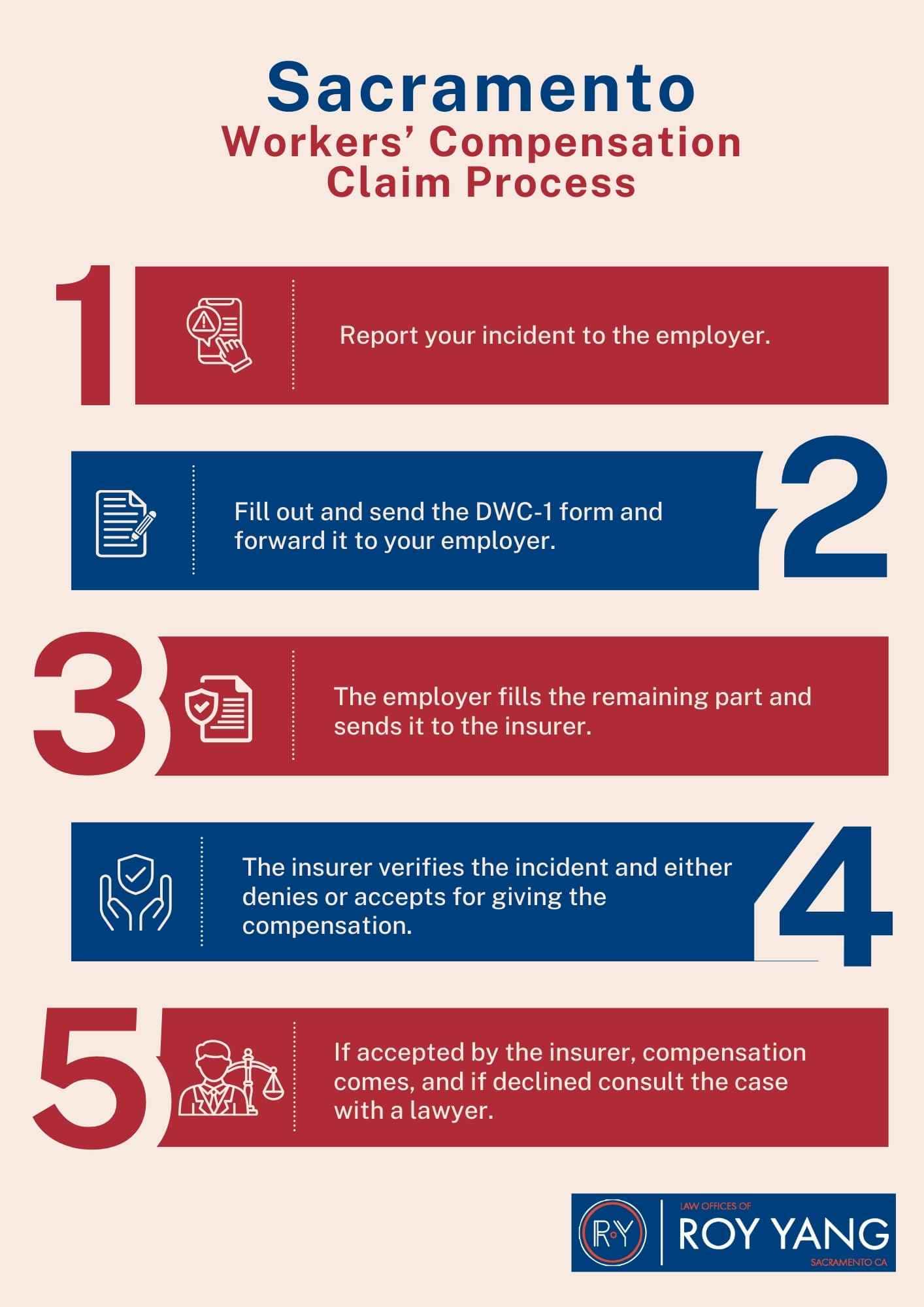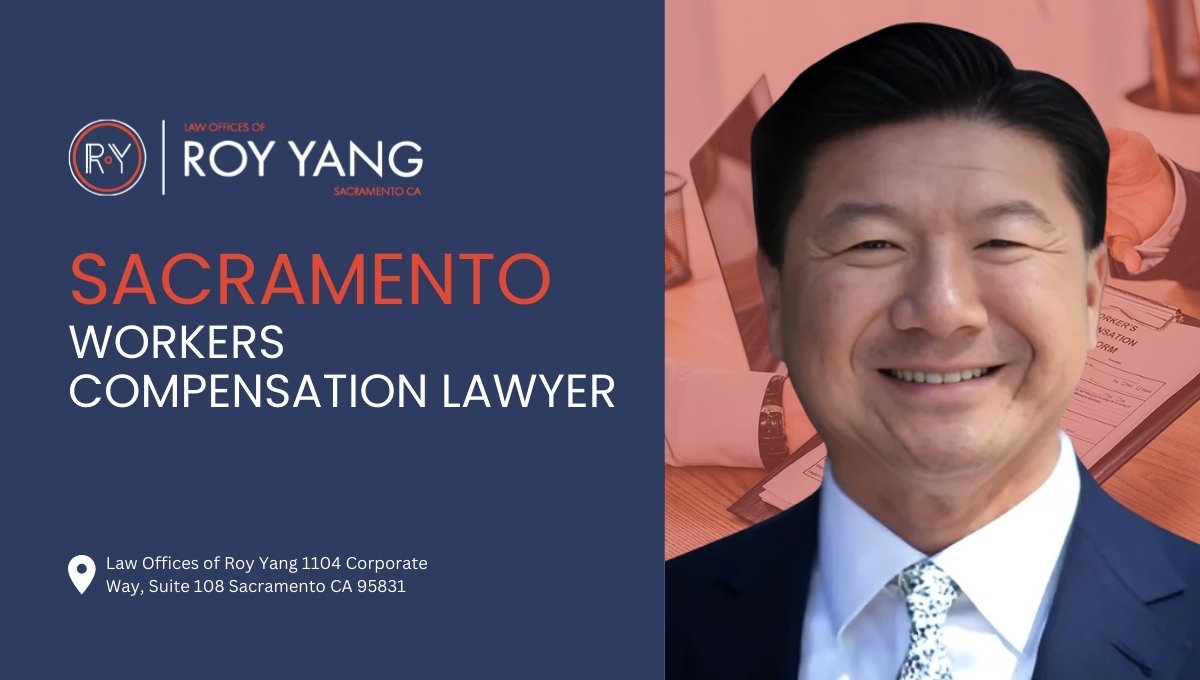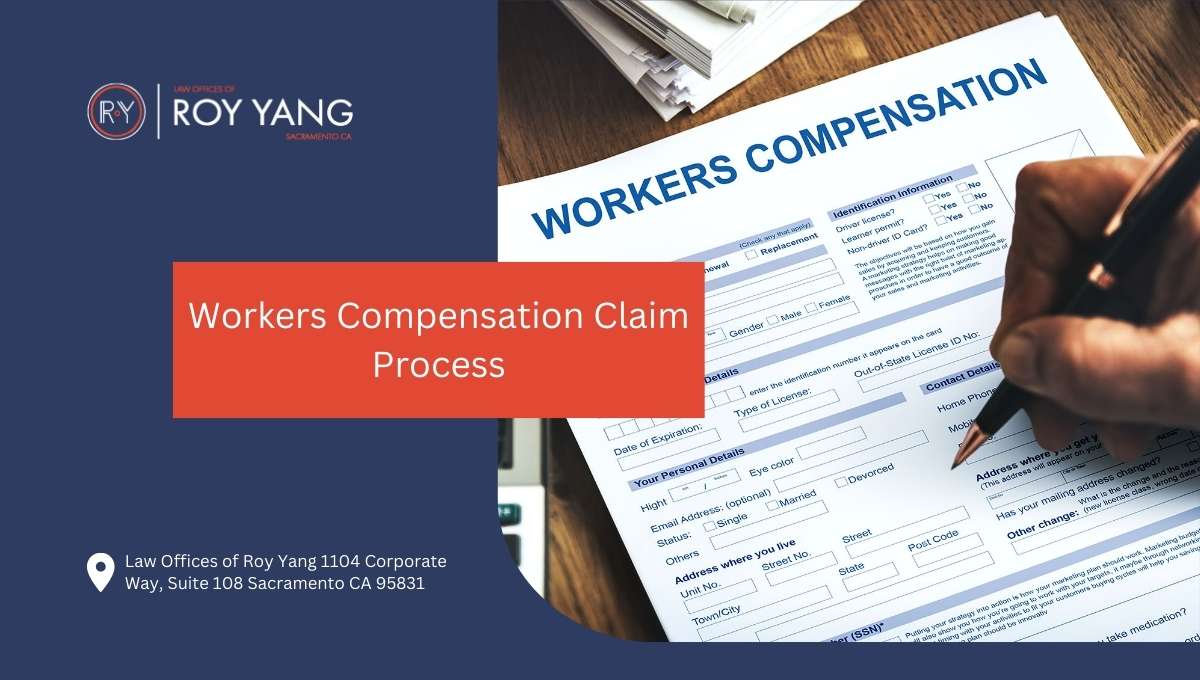Suffering a workplace injury can be overwhelming—not only are you dealing with medical treatment, but you may also be facing financial stress due to lost wages. Fortunately, workers’ compensation benefits are designed to cover your medical expenses, wage replacement, and rehabilitation costs.
However, the workers compensation claims process can be complex, and even small mistakes can lead to delays or denials. Understanding the proper steps ensures you receive the full benefits you’re entitled to. Roy Yang Law gives a complete guide to navigating the claim process in Sacramento.
Key Takeaways
- You must report your injury to your employer immediately; delays can hurt your claim.
- Filing the DWC-1 claim form promptly is essential to begin the benefits process.
- The claims process includes investigations, medical evaluations, and strict legal deadlines.
- Delays or denials often happen due to incomplete paperwork, missed deadlines, or employer disputes.
- A workers’ compensation lawyer can guide you through the filing process, avoid costly mistakes, and help with denied or delayed claims.
How Does the Workers’ Compensation Claim Process Work?
Filing a successful claim for workers’ compensation requires careful documentation and adherence to deadlines. A well-prepared claim increases your chances of receiving benefits such as medical coverage and wage replacement.
To avoid delays or denials, follow these critical steps:
Step 1: Seek Medical Treatment
- Prioritize Your Health: Get medical attention immediately. If your employer has a designated healthcare provider, visit their approved doctor. Otherwise, you may choose your own physician.
- Notify Your Doctor: Inform your doctor that your injury is work-related so they can document it properly.
- Keep Records: Maintain detailed records of your medical history, treatment, and expenses to support your claim.
Step 2: Report the Injury
- Act Quickly: Notify your employer within 30 days of the accident. Late reporting can jeopardize your claim.
- Submit a Written Report: Always document your injury in writing and ensure your employer acknowledges receipt.
- Keep a Copy: Retain a copy of your report for future reference, especially in case of disputes.
Step 3: Employer and Insurance Responsibilities
- Receive and Complete Form DWC-1: Your employer must provide the Workers’ Compensation Claim Form (DWC-1) within one business day of reporting your injury. If not, you can download it from the Division of Workers’ Compensation (DWC) website.
- Submit the Completed Form: Fill out your portion and return it to your employer, who will forward it to the insurance company for review.
- Insurance Claim Review: The insurance company evaluates your claim, verifies details, and determines eligibility. If you don’t receive a response within 90 days, your claim is presumed accepted.
Process For Filing Workers’ Compensation Claim in Sacramento
A structured approach to filing ensures that your claim moves forward smoothly. Here’s a simple breakdown:
- Report your incident to your employer.
- Seek medical treatment immediately.
- Fill out and submit the DWC-1 form to your employer.
- The employer completes their portion and sends it to the insurer.
- The insurer investigates and either approves or denies the claim.
- If denied, consult with a workers’ compensation lawyer to file an appeal.

Key Deadlines to Know
Understanding the critical deadlines in the workers’ compensation process helps you protect your rights:
- 30 Days: Report your injury to your employer.
- 90 Days: The insurance company must respond to your claim.If they do not, it is presumed accepted.
- 1 Year: If your claim is denied, you have one year to file a legal claim and appeal.
- 20 Days: If denied, you have 20 days to file an appeal for reconsideration.
Missing these deadlines may result in forfeiting your right to compensation.
Common Mistakes to Avoid
Many injured workers unknowingly make errors that jeopardize their claims. Here are the most common pitfalls to watch out for:
- Missing the Reporting Deadline: Reporting your injury within 30 days is crucial.
- Insufficient Medical Evidence: A lack of proper medical documentation can result in claim denials. Keep detailed records of your treatment.
- Settling Too Early: Accepting a settlement without consulting a lawyer may result in inadequate benefits.
- Lack of Communication: Stay in touch with your insurer and employer to ensure a smooth process.
- Incomplete Treatment: Follow your prescribed treatment plan to demonstrate the severity of your injury.
- Providing Recorded Statements Without Legal Advice: Insurers may use statements against you. Seek legal guidance before speaking with them.
By avoiding these mistakes and hiring a workers’ comp lawyer when needed, you can significantly improve your chances of a successful claim.
How a Lawyer Can Help With Filing?
Even minor mistakes can delay or derail your workers’ compensation claim. An experienced lawyer can:
- Strengthen Your Claim: Ensure proper documentation and gather strong evidence.
- Maximize Compensation: Ensure you receive fair benefits, including coverage for future medical costs.
- Negotiate on Your Behalf: Handle discussions with insurers to secure a fair settlement.
- Handle Appeals and Hearings: Represent you if your claim is denied or disputed.
- Document Key Details: Collect witness statements and expert opinions.
- Ensure Accuracy: Submit your claim correctly to avoid unnecessary delays.
Having a skilled attorney by your side improves your chances of a successful claim.
How to Deal With Delayed Workers’ Compensation Claims?
Waiting for your workers’ compensation benefits can be frustrating, especially when medical bills and lost wages start piling up. Unfortunately, claim delays are common and can happen for various reasons—some avoidable, others beyond your control. Understanding why your claim might be delayed is the first step in addressing the issue and ensuring you receive the compensation you deserve.
Why Claims Get Delayed?
Claims can be delayed for various reasons, often leaving injured workers without the support they need. Here are some common causes of delays:
- Ongoing Investigations: Insurance companies may conduct thorough reviews to verify the details of your injury before approving benefits.
- Disputes Over the Cause: If your employer or the insurer questions whether your injury is truly work-related, it can lead to lengthy delays.
- Incomplete or Incorrect Paperwork: Missing information, errors in forms, or improperly filed documents can slow down claim processing.
- Lack of Sufficient Evidence: If your claim lacks strong medical records, accident reports, or witness statements, the insurer may delay approval.
- Pending Medical Evaluations: Delays in receiving official medical assessments or independent medical evaluations (IMEs) can stall your claim.
Steps to Resolve a Delay
Take these steps to regain control of your claim and reduce unnecessary delays. Here’s what you can do to resolve the issue efficiently:
- Consult a Lawyer: An experienced workers’ compensation attorney can identify the cause of the delay, address disputes, and ensure your claim is handled properly.
- Identify the Reason for the Delay: Check with your employer, insurer, or the Division of Workers’ Compensation (DWC) to determine what’s causing the holdup.
- Provide Missing Information or Evidence: If your claim lacks necessary documentation, gather and submit any missing paperwork, medical records, or witness statements.
- Follow Up Consistently: Stay proactive by contacting the DWC, your employer, and the insurance company daily to track your claim’s progress and push for resolution.
- Ensure Paperwork is Complete: Double-check that all forms, medical evaluations, and supporting evidence are properly submitted to avoid further processing delays.
How to Appeal For Denied Workers’ Compensation Claims?
If your claim is denied, you have the right to appeal. Follow these steps:
- 1. Review the Denial Letter
Understand why your claim was rejected—common reasons include missing paperwork, lack of evidence, or disputes over your injury being work-related. - 2. Gather Supporting Evidence
Strengthen your appeal with additional documents such as:- Medical records
- Doctor’s statements
- Witness testimonies
- Accident reports
- 3. File an Appeal with the Workers’ Compensation Appeals Board (WCAB)
Request a hearing by submitting a Petition for Reconsideration or a Declaration of Readiness to Proceed (DOR). - 4. Attend Your Hearing
Present your case before a judge with medical evidence and witness statements. - 5. Continue to Higher Appeals If Necessary
If denied again, escalate the case to the California Court of Appeals.
Why You Need a Sacramento Workers’ Compensation Lawyer
Workers’ compensation laws can be confusing, and insurance companies don’t always make the process easy. At Law Offices of Roy Yang, we understand the challenges you’re facing. Our team is committed to helping injured workers secure the compensation they deserve.
You shouldn’t have to navigate this process alone—focus on your recovery while we handle the legal side.
What You’re Entitled to in a Workers’ Compensation Claim:
If your claim is approved, you may be eligible for:
Medical Benefits
Coverage for doctor visits, hospital bills, medication, surgeries, physical therapy, and other necessary treatments related to your injury.
Temporary Disability Benefits
If your injury prevents you from working temporarily, you may receive partial wage replacement.
Permanent Disability Benefits
If your injury leads to a lasting impairment, you may qualify for ongoing compensation.
Death Benefits
Families of workers who suffer fatal work-related injuries may receive financial support, including funeral and burial expenses.
Supplemental Job Displacement Benefits
If you can’t return to your previous job due to injury, you may receive retraining assistance or a voucher to develop new job skills.
Workplace Injuries Covered Under Workers’ Compensation
Common Injuries Covered
Workers’ compensation covers a wide range of injuries that occur in the workplace, including:
Slips, trips, and falls leading to sprains, fractures, or head injuries
Repetitive stress injuries (RSIs) such as carpal tunnel syndrome and tendonitis
Machinery-related accidents causing cuts, amputations, or crush injuries
Lifting and overexertion injuries resulting in back pain or muscle strains
Occupational Illnesses and Mental Health Claims
In addition to physical injuries, workers’ compensation also covers:
Occupational illnesses caused by exposure to toxic substances, dust, or chemicals.

Mental health conditions such as work-related stress, anxiety, depression, or post-traumatic stress disorder (PTSD) linked to workplace incidents.
Contact Our Sacramento Workers’ Compensation Lawyers

Consult your case today and get a broader perspective on how to process a worker’s compensation claim from Sacramento workers compensation lawyer at Law Offices of Roy Yang.
Don’t delay—reach out now to ensure you receive the workers’ compensation benefits you deserve in a timely manner.
Frequently Asked Questions About Workers’ Compensation
What if my employer doesn’t have insurance?
If your employer doesn’t have insurance, the Uninsured Employers Benefits Trust Fund (UEBTF) will pay the compensation. Also, you can file a lawsuit against the employer.
How long does it take to receive benefits?
It takes about two weeks to a month to receive the benefits. However this can vary depending on your case along with the disputes or delays.
Who is eligible for workers' compensation?
Any employee working directly with the company is eligible for Workers’ Compensation.
How do I check my workers' comp status?
You can check your Workers’ Comp Status by visiting the office or site of the Division of Workers’ Compensation Office (DWC). Also, you can contact your employer or insurance company for updates.
How long can you stay on workers comp?
You can stay up to 104 weeks or more on Workers comp based on the severity of your injury.
Can you get another job while on workers comp?
Yes, you can get another job while on workers comp if your injuries don’t exaggerate and the doctor permits you.
Can you collect workers' comp after being fired?
Yes, it is possible to collect workers’ compensation after being fired, but the process can involve legal complexities depending on the circumstances of the injury and termination.



